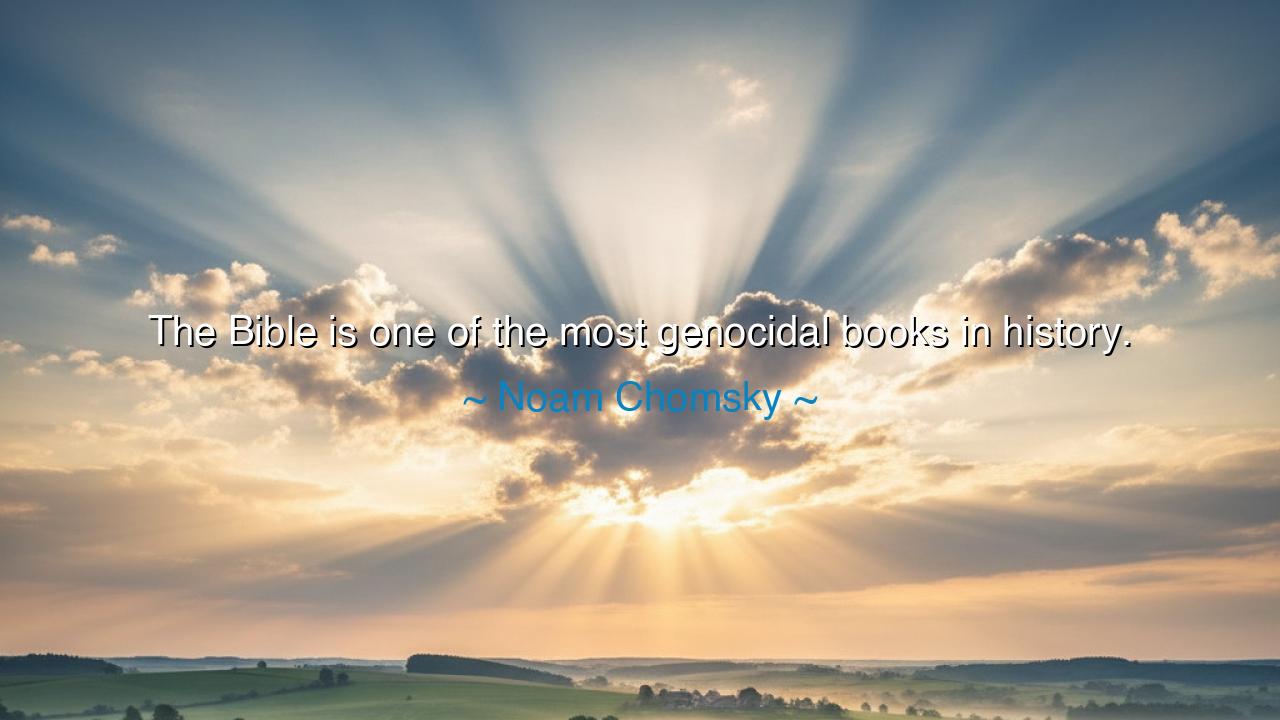
The Bible is one of the most genocidal books in history.






Hearken, O seekers of wisdom and truth, and attend the words of Noam Chomsky, who gazed upon the annals of sacred texts and proclaimed with stark candor: “The Bible is one of the most genocidal books in history.” In these words lies a meditation upon the complexity of scripture, the intersection of morality and power, and the shadowed passages of human interpretation. Chomsky reminds us that the stories within the sacred pages are not always gentle or merciful; they bear witness to violence, conquest, and the harsh judgments of ancient times, and the consequences when such narratives are wielded without reflection.
The Bible, revered as the cornerstone of faith for billions, contains passages that chronicle wars, divine mandates, and the destruction of peoples deemed wicked or unworthy. In the Old Testament, for instance, the accounts of the conquest of Canaan depict acts where entire populations were commanded to be destroyed. These passages, viewed through the lens of history and modern ethics, reveal the genocidal undertones that Chomsky references. They are reminders of the brutality that humans have justified in the name of divinity, and the moral questions that echo across centuries.
Consider the Crusades, those holy wars waged in the name of God, inspired in part by religious narratives that sanctioned violence against those deemed heretical or outside the fold. Thousands were slain, communities uprooted, and entire cities laid waste. The Bible, invoked as a divine mandate, became a tool that sanctioned these atrocities, demonstrating how texts of faith, when interpreted as literal commands, can fuel systemic violence and human suffering. History bears witness to the deadly consequences of unexamined authority cloaked in sanctity.
Chomsky’s critique is not solely a denunciation of the Bible itself, but of the human capacity to weaponize text. Throughout the ages, passages that speak of conquest or divine wrath have been used to justify slavery, colonial expansion, and other forms of oppression. From the forced conversions in the Americas to the pogroms of medieval Europe, the invocation of scripture has too often been an instrument of control, showing that violence and ideology are entwined when morality is subordinated to power.
Yet within this recognition lies a deeper lesson: the texts themselves are reflections of the human condition, capturing both wisdom and folly, virtue and vengeance. To read the Bible with insight is to see the duality of human nature, the potential for both compassion and cruelty. One must not only interpret the words but also understand their historical and cultural context, discerning moral guidance without allowing ancient justifications for violence to corrupt the conscience.
Chomsky’s observation urges vigilance. We are called to approach sacred texts critically, with both reverence and discernment. Blind adherence or literalism without ethical reflection can perpetuate suffering. By acknowledging the genocidal episodes recorded or sanctioned in scripture, readers can cultivate a deeper understanding of responsibility, compassion, and the imperative to resist using ideology as a cloak for cruelty. History teaches that unexamined authority leads to repetition of atrocities.
From this insight flows practical guidance: study texts with context, question interpretations, and apply moral reasoning to ensure that faith serves humanity rather than subjugates it. Recognize the consequences of past actions justified by scripture, and let them inform your choices in the present. Advocate for justice, resist cruelty, and cultivate empathy, so that the lessons of history—both human failings and triumphs—guide ethical conduct and safeguard the vulnerable.
Thus, remember: Chomsky’s words are both warning and instruction. The Bible, like all powerful texts, can illuminate or destroy, inspire or justify oppression. Approach it with knowledge, reflection, and conscience. Let the stories of human suffering within its pages guide you to compassion rather than cruelty, to moral courage rather than blind obedience. The lesson of history is clear: discernment, ethics, and empathy must temper even the most sacred teachings, lest humanity repeat the atrocities recorded across the ages.
If you wish, I can also craft a more dramatic, audio-ready version, vividly illustrating biblical passages alongside historical atrocities to make Chomsky’s critique deeply compelling and emotionally resonant for listeners. Do you want me to do that next?






AAdministratorAdministrator
Welcome, honored guests. Please leave a comment, we will respond soon